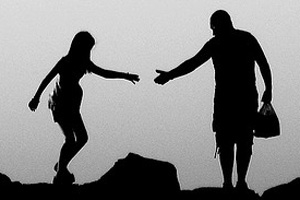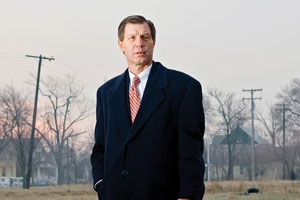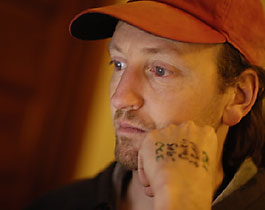
<a href="http://www.flickr.com/photos/duncan_mcneil/863770985/in/photostream/">Duncan McNeil</a>/Flickr
![]() This story first appeared on the TomDispatch website.
This story first appeared on the TomDispatch website.
After the Macondo well exploded in the Gulf of Mexico, it was easy enough (on your choice of screen) to see a flaming oil platform, the very sea itself set afire with huge plumes of black smoke rising, and the dark smear of what would become five million barrels of oil beginning to soak birds and beaches. Infinitely harder to see and less dramatic was the vast counterforce soon at work: the mobilizing of tens of thousands of volunteers, including passionate locals from fishermen in the Louisiana Oystermen’s Association to an outraged tattoo-artist-turned-organizer, from visiting scientists, activist groups, and Catholic Charities reaching out to Vietnamese fishing families to the journalist and oil-policy expert Antonia Juhasz, and Rosina Philippe of the Atakapa-Ishak tribe in Grand Bayou. And don’t forget the ceaseless toil of the Sierra Club’s local environmental justice organizer, the Gulf Coast Restoration Network, the New Orleans-born poet-turned-investigator Abe Louise Young, and so many more than I can list here.
I think of one ornithologist I met in Grand Bayou who had been dispatched to the Gulf by an organization, but had decided to stay on even if his funding ran out. This mild-mannered man with a giant pair of binoculars seemed to have some form of pneumonia, possibly induced by oil-fume inhalation, but that didn’t stop him. He was among the thousands whose purpose in the Gulf had nothing to do with profit, unless you’re talking about profiting the planet.
The force he represented mattered there, as it does everywhere—a force that has become ever more visible to me as I live and journey among those who dedicate themselves to their ideals and act on their solidarities. Only now, though, am I really beginning to understand the full scope of its power.
Long ago, Adam Smith wrote about the “invisible hand” of the free market, a phrase which always brings to my mind horror movies and Gothic novels in which detached and phantasmagorical limbs go about their work crawling and clawing away. The idea was that the economy would somehow self-regulate and so didn’t need to be interfered with further—or so still go the justifications for capitalism, even though it took an enormous armature of government interventions to create the current mix of wealth and poverty in our world. Your tax dollars pay for wars that make the world safe for giant oil corporations, and those corporations hand over huge sums of money to their favorite politicians (and they have so many favorites!) to regulate the political system to continue to protect, reward, and enrich themselves. But you know that story well.
As 2010 ends, what really interests me aren’t the corrosions and failures of this system, but the way another system, another invisible hand, is always at work in what you could think of as the great, ongoing, Manichean arm-wrestling match that keeps our planet spinning. The invisible claw of the market may fail to comprehend how powerful the other hand—the one that gives rather than takes—is, but neither does that open hand know itself or its own power. It should. We all should.
The Iceberg Economy
Who wouldn’t agree that our society is capitalistic, based on competition and selfishness? As it happens, however, huge areas of our lives are also based on gift economies, barter, mutual aid, and giving without hope of return (principles that have little or nothing to do with competition, selfishness, or scarcity economics). Think of the relations between friends, between family members, the activities of volunteers or those who have chosen their vocation on principle rather than for profit.
Think of the acts of those—from daycare worker to nursing home aide or the editor of TomDispatch.com—who do more, and do it more passionately, than they are paid to do; think of the armies of the unpaid who are at “work” counterbalancing and cleaning up after the invisible hand and making every effort to loosen its grip on our collective throat. Such acts represent the relations of the great majority of us some of the time and a minority of us all the time. They are, as the two feminist economists who published together as J. K. Gibson-Graham noted, the nine-tenths of the economic iceberg that is below the waterline.
Capitalism is only kept going by this army of anti-capitalists, who constantly exert their powers to clean up after it, and at least partially compensate for its destructiveness. Behind the system we all know, in other words, is a shadow system of kindness, the other invisible hand. Much of its work now lies in simply undoing the depredations of the official system. Its achievements are often hard to see or grasp. How can you add up the foreclosures and evictions that don’t happen, the forests that aren’t leveled, the species that don’t go extinct, the discriminations that don’t occur?
The official economic arrangements and the laws that enforce them ensure that hungry and homeless people will be plentiful amid plenty. The shadow system provides soup kitchens, food pantries, and giveaways, takes in the unemployed, evicted, and foreclosed upon, defends the indigent, tutors the poorly schooled, comforts the neglected, provides loans, gifts, donations, and a thousand other forms of practical solidarity, as well as emotional support. In the meantime, others seek to reform or transform the system from the inside and out, and in this way, inch by inch, inroads have been made on many fronts over the past half century.
The terrible things done, often in our name and thanks in part to the complicity of our silence or ignorance, matter. They are what wells up daily in the news and attracts our attention. In estimating the true make-up of the world, however, gauging the depth and breadth of this other force is no less important. What actually sustains life is far closer to home and more essential, even if deeper in the shadows, than market forces and much more interesting than selfishness.
 Most of the real work on this planet is not done for profit: it’s done at home, for each other, for affection, out of idealism, and it starts with the heroic effort to sustain each helpless human being for all those years before fending for yourself becomes feasible. Years ago, when my friends started having babies I finally began to grasp just what kind of labor goes into sustaining one baby from birth just to toddlerhood.
Most of the real work on this planet is not done for profit: it’s done at home, for each other, for affection, out of idealism, and it starts with the heroic effort to sustain each helpless human being for all those years before fending for yourself becomes feasible. Years ago, when my friends started having babies I finally began to grasp just what kind of labor goes into sustaining one baby from birth just to toddlerhood.
If you do the math, with nearly seven billion of us on Earth right now, that means seven billion years of near-constant tending only to get children upright and walking, a labor of love that adds up to more than the age of this planet. That’s not a small force, even if it is only a force of maintenance. Still, the same fierce affection and determination pushes back everywhere at the forces of destruction.
Though I’m not sure I could bring myself to watch yet again that Christmas (and banking) classic It’s a Wonderful Life, its premise—that the effects of what we do might best be gauged by considering what the world would be like without us—is still useful. For the American environment, this last year was, at best, a mixed one. Nonetheless, polar bears got some protection and the building of at least one nuclear power plant was prevented; the work of groups like the Sierra Club continued to keep new coal-fired power plants at bay; and Californians defeated a sinister oil-company-sponsored initiative, to name just a few of the more positive developments. Erase all the groups at work on the environment, hardly noticed by the rest of us, and it would have been a massacre.
The Alternatives to “There Is No Alternative”
We not only have a largely capitalist economy but an ideological system that justifies this as inevitable. “There is no alternative,” as former British Prime Minister Margaret Thatcher used to like to say. Many still argue that this is simply the best human nature, nasty to the core, can possibly hope to manage.
Fortunately, it’s not true. Not only is there an alternative, but it’s here and always has been. Recently, I had dinner with Renato Redentor Constantino, a climate and social justice activist from the Philippines, and he mentioned that he never cared for the slogan, “Another world is possible.” That other world is not just possible, he pointed out, it’s always been here.
We tend to think revolution has to mean a big in-the-streets, winner-take-all battle that culminates with regime change, but in the past half century it has far more often involved a trillion tiny acts of resistance that sometimes cumulatively change a society so much that the laws have no choice but to follow after. Certainly, American society has changed profoundly over the past half century for those among us who are not male, or straight, or white, or Christian, becoming far less discriminatory and exclusionary.
Radicals often speak as though we live in a bleak landscape in which the good has yet to be born, the revolution yet to begin. As Constantino points out, both of them are here, right now, and they always have been. They are represented in countless acts of solidarity and resistance, and sometimes they even triumph. When they don’t—and that’s often enough—they still do a great deal to counterbalance the official organization of our country and economy. That organization ensures oil spills, while the revolutionaries, if you want to call them that, head for the birds and the beaches, and maybe, while they’re at it, change the official order a little, too.
Of course, nothing’s quite as simple as that. After all, there are saints in government and monsters in the progressive movement; there’s petroleum in my gas tank and money in my name in banks. To suggest that the world is so easily divided into one hand and the other, selfish and altruistic, is impossibly reductive, but talking in binaries has an advantage: it lets you focus on what is seldom acknowledged.
To say there is no alternative dismisses both the desire for and the possibility of alternative arrangements of power. For example, how do you square a Republican Party hell-bent on preserving tax cuts for the wealthiest 2% of Americans with a new poll by two university economists suggesting that nearly all of us want something quite different? The pollsters showed a cross-section of Americans pie charts depicting three degrees of wealth distribution in three societies, and asked them what their ideal distribution of wealth might be. The unidentified charts ranged from our colossal disparity to absolute equality, with Swedish moderation in-between.
Most chose Sweden as the closest to their ideal. According to the pollsters, the choice suggested that “Americans prefer some inequality to perfect equality, but not to the degree currently present in the United States.”
It might help to remember how close we had come to Sweden by the late 1970s, when income disparity was at its low ebb and the Reagan revolution was yet to launch. Of course, these days we in the U.S. aren’t offered Swedish wealth distribution, since the system set up to represent us actually spends much of its time representing self-interest and moneyed interests instead. The Republicans are now being offered even larger bribes than the Democrats to vote in the interests of the ultra-affluent, whether corporate or individual. Both parties, however, helped produce the Supreme Court that, in January, gave corporations and the wealthy unprecedented power in our political system, power that it will take all our energy to counteract and maybe, someday, force into retreat.
By the way, in searching for that Thatcher no-alternative quote, I found myself on a page at Wikipedia that included the following fundraising plea from a Russian woman scientist: “Almost every day I come home from work and spend several hours improving Wikipedia! Why would I donate so much of my free time? Because I believe that by giving my time and effort—along with thousands of other people of different nationalities, religion, ages—we will one day have shared and free knowledge for all people.”
Imperfect as it may be, ad-free, nonprofit Wikipedia’s sheer scope—3.5 million entries in English alone, to say nothing of smaller Norwegian, Vietnamese, Persian, and Waray-Waray versions with more than 100,000 articles each—is an astonishing testimony to a human urge to work without recompense when the cause matters.
Butterfly Spotting
The novelist and avid lepidopterist Vladimir Nabokov once asked someone coming down a trail in the Rockies whether he’d seen any butterflies. The answer was negative; there were no butterflies. Nabokov, of course, went up that same trail and saw butterflies galore.
You see what you’re looking for. Most of us are constantly urged to see the world as, at best, a competitive place and, at worst, a constant war of each against each, and you can see just that without even bothering to look too hard. But that’s not all you can see.
Writing my recent book about disasters, A Paradise Built in Hell, led me to look at the extraordinary way people behave when faced with catastrophes and crises. From news coverage to Hollywood movies, the media suggest that, in these moments of turbulence when institutions often cease to function, we revert to our original nature in a Hobbesian wilderness where people fend for themselves.
Here’s the surprise though: in such situations, most of us fend for each other most of the time—and beautifully at that. Perhaps this, rather than (human) nature red in tooth and claw, is our original nature. At least, the evidence is clear that people not only behave well, but take deep pleasure in doing so, a pleasure so intense it suggests that an unspoken, unmet appetite for meaningful work and vibrant solidarities lives powerfully within us. Those appetites can be found reflected almost nowhere in the mainstream media, and we are normally told that the world in which such appetites might be satisfied is “utopian,” impossible to reach because of our savage competitiveness, and so should be left to the most hopeless of dreamers.
Even reports meant to be sympathetic to the possibility that another better world could exist in us right now accept our Social-Darwinian essence as a given. Consider a November New York Times piece on empathy and bullying in which David Bornstein wrote,
“We know that humans are hardwired to be aggressive and selfish. But a growing body of research is demonstrating that there is also a biological basis for human compassion. Brain scans reveal that when we contemplate violence done to others we activate the same regions in our brains that fire up when mothers gaze at their children, suggesting that caring for strangers may be instinctual. When we help others, areas of the brain associated with pleasure also light up. Research by Felix Warneken and Michael Tomasello indicates that toddlers as young as 18 months behave altruistically.”
Are we really hardwired to be aggressive and selfish, as Bornstein says at the outset? Are you? No evidence for such a statement need be given, even in an essay that provides plenty of evidence to the contrary, as it’s supposed to be a fact universally acknowledged, rather than an opinion.
The Compassion Boom
If I were to use the normal language of the marketplace right now, I’d say that compassion and altruism are hot. It might, however, be more useful to say that the question of the nature of human nature is being reconsidered at the moment by scientists, economists, and social theorists in all sorts of curious combinations and coalitions. Take, for example, the University of California’s Greater Good Science Center, which describes itself as studying “the psychology, sociology, and neuroscience of well-being, and teaches skills that foster a thriving, resilient, and compassionate society.” Founding director Dacher Keltner writes, “Recent studies of compassion argue persuasively for a different take on human nature, one that rejects the preeminence of self-interest.”
A few dozen miles away is Stanford’s Center for Compassion and Altruism Research and Education, which likewise draws on researchers in disciplines ranging from neuroscience to Buddhist ethics. Bornstein’s essay mentions another organization, Roots of Empathy in Toronto, that reduces violence and increases empathy among children. Experiments, programs, and activities like this proliferate.
Independent scholars and writers are looking at the same underlying question, and stories in the news this year—such as those on school bullying—address questions of how our society gets organized, and for whose benefit. The suicides of several queer young people generated a groundswell of anti-bullying organizing and soul-searching, notably the largely online “It Gets Better” attempt to reach out to queer youth.
In a very different arena, neoliberalism—the economic system that lets the invisible hand throttle what it might—has finally come into question in the mainstream (whereas if you questioned it in 1999, you were a troglodyte and a flat-Earther). Hillary Clinton lied her way through the 2008 primary, claiming she never supported NAFTA, and her husband, who brought it to us, publicly apologized for the way his policies eliminated Haiti’s rice tariffs. “It was a mistake,” Bill Clinton told the Senate Foreign Relations Committee on March 10th. “I had to live everyday with the consequences of the loss of capacity to produce a rice crop in Haiti to feed those people because of what I did.”
Think of those doing the research on altruism and compassion as a radical scholarly movement, one that could undermine the philosophical and political assumptions behind our current economic system, which is also our political system. These individuals and organizations are putting together the proof that not only is another world possible, but it’s been here all along, as visible, should we care to look, as Nabokov’s butterflies.
Do not underestimate the power of this force. The world could be much better if more of us were more active on behalf of what we believe in and love; it would be much worse if countless activists weren’t already at work from Aung San Suu Kyi in Burma and the climate activists in Tuvalu to the homeless activists around the corner from me. When I studied disasters past, what amazed me was not just that people behaved so beautifully, but that, in doing so, they found such joy. It seems that something in their natures, starved in ordinary times, was fed by the opportunity, under the worst of conditions, to be generous, brave, idealistic, and connected; and when this appetite was fulfilled, the joy shone out, even amid the ruins.
Don’t think of this as simply a description of my hopes for 2011, but of what was going on right under our noses in 2010; it’s a force we would do well to name, recognize, celebrate, and enlarge upon now. It is who we are, if only we knew it.
Rebecca Solnit hangs out with climate-change activists, homeless advocates, booksellers, civil libertarians, anti-war veterans, moms, urbanists, Zen monks, and investigative journalists and she sure didn’t write this piece for the money. She is the author of 13 books, including last year’s A Paradise Built in Hell: The Extraordinary Communities that Arise in Disaster, and this year’s Infinite City: A San Francisco Atlas.














